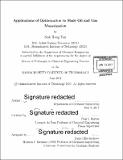Applications of optimization to shale oil and gas monetization
Author(s)
Tan, Siah Hong
DownloadFull printable version (19.23Mb)
Other Contributors
Massachusetts Institute of Technology. Department of Chemical Engineering.
Advisor
Paul I. Barton.
Terms of use
Metadata
Show full item recordAbstract
This thesis addresses the challenges brought forth by the shale oil and gas revolution through the application of formal optimization techniques. Two frameworks, each addressing the monetization of shale oil and gas resources at different ends of the scale spectrum, are developed. Importantly, these frameworks accounted for both the dynamic and stochastic aspects of the problem at hand. The first framework involves the development of a strategy to allocate small-scale mobile plants to monetize associated or stranded gas. The framework is applied to a case study in the Bakken shale play where large quantities of associated gas are flared. Optimal strategies involving the continuous redeployment of plants are analyzed in detail. The value of the stochastic solution with regards to uncertainty in resource availability is determined and it indicates that mobile plants possess a high degree of flexibility to handle uncertainty. The second framework is a comprehensive supply chain optimization model to determine optimal shale oil and gas infrastructure investments in the United States. Assuming two different scenario sets over a time horizon of twenty-five years, the features of the optimal infrastructure investments and associated operating decisions are determined. The importance of incorporating uncertainty into the framework is demonstrated and the relationship between the stability of the stochastic solution and the variance of the distribution of future parameters is analyzed. The thesis also analyzes the Continuous Flow Stirred Tank Reactor (CFSTR) equivalence principle as a method for screening and targeting favorable reaction pathways, with applications directed towards gas-to-liquids conversion. The principle is found to have limited usefulness when applied to series reactions due to an unphysical independence of the variables which allows for the maximization of production of any intermediate species regardless of the magnitude of its rate of depletion. A reformulation which eliminates the unphysical independence is proposed. However, the issue of arbitrary truncation of downstream reactions remains.
Description
Thesis: Ph. D., Massachusetts Institute of Technology, Department of Chemical Engineering, 2017. Cataloged from PDF version of thesis. Includes bibliographical references (pages 259-274).
Date issued
2017Department
Massachusetts Institute of Technology. Department of Chemical EngineeringPublisher
Massachusetts Institute of Technology
Keywords
Chemical Engineering.